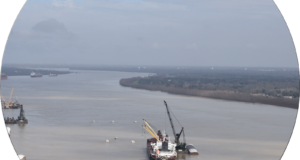Seaports need specialized skill sets that vary by port and evolve over time, which means human resource departments are being continually tasked with aligning ports’ needs with skilled candidates.
By Lori Musser

With a skilled and diligent workforce, a seaport can do much more than administer facilities and programs. It can fulfill the dreams and aspirations of a community and region, providing opportunities for prosperity and enhancing quality of life.
To do that, seaports need specialized skill sets which vary by port and evolve over time.
Seaport human resource departments play an important role in ensuring that the right people are in place at the right time. Joan MacLeod, director of human resources at Halifax Port Authority, said, “People are always the very best assets of the organization. Finding the right people can be as easy as being up front about the role. Don’t sugar coat it. And then give them the tools and training needed to get the job done.”
As seaports increasingly recognize their interdependence with local communities and supply chains, that philosophy is encouraging partnerships with educational institutions, potential workforce candidates and supply chain partners.
Ports have introduced initiatives such as scholarships, internships, in-house training and academic visits in an effort to ensure that they are never left with an empty seat and nobody to fill it.
Academic Visits in Barranquilla
Recognizing that the students of today are the workforce of tomorrow, the Port of Barranquilla offers students a peek at logistics and operations, port history, investments, terminals and navigable waters, through an Academic Visit Program.
The program was launched with a vision of integrating and thereby strengthening Barranquilla’s port-city identity.
“Initially it was only focused on municipal colleges and universities, but over time it has evolved according to the needs of academia, and not only of the city but of the country as well,” said Giannina Guerrero Raad, the port’s manager of marketing and communication.
She said that the program is geared to university students who are pursuing careers or subjects related to the port sector. “Its main benefit shows how terminal operations, foreign trade dynamics and this type of organization function in real-life situations. It allows students to complement what they’ve learned in the classroom and gain new knowledge beyond textbooks,” said Guerrero Raad.
The outreach program has been extremely successful, with visitation dates filling up almost as soon as they are posted. “Teachers of different programs always return with new students to participate in this initiative, which tells the port, informally, of the program’s value,” said Guerrero Raad. Periodic surveys help the port better gauge satisfaction and collect ideas for continuous improvement.
Specialized Security Training in Manatee
Internal training is a mainstay at seaports but sometimes a port sees and fills a need that is greater than its own.
David St. Pierre is director of public safety and security for Port Manatee. He spearheaded development of a Facility Security Officer training program that is delivered to nationwide participants with port facility security responsibilities. This may include staff from ports, terminal operators, stevedores, private security or even state or federal agencies.
 AAPA Seaports
AAPA Seaports


